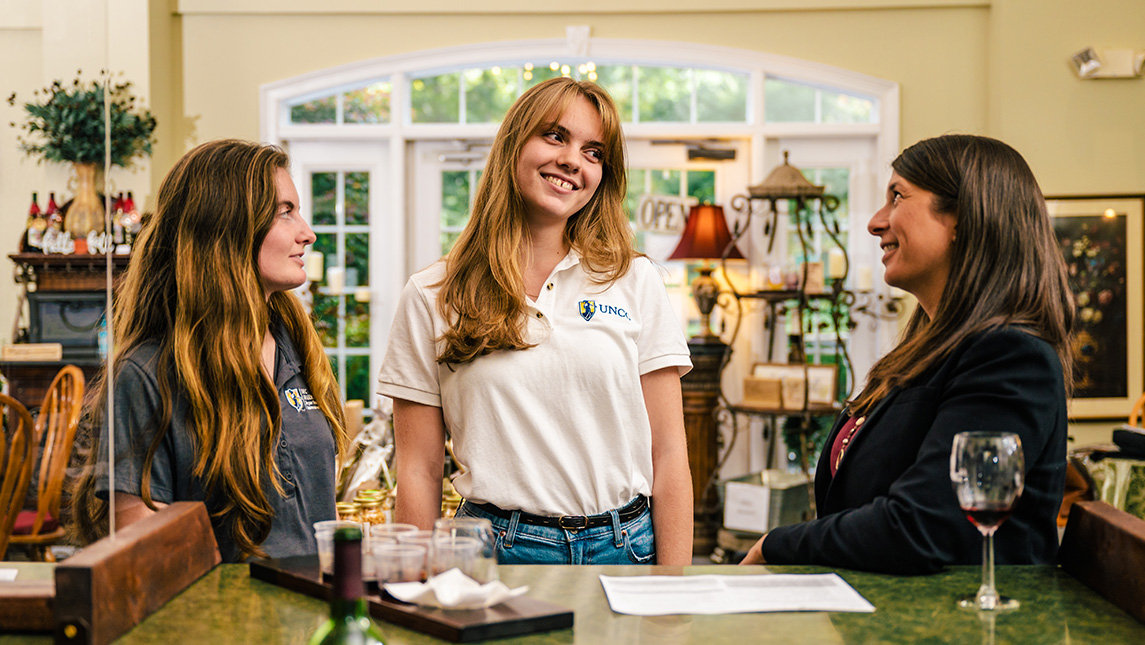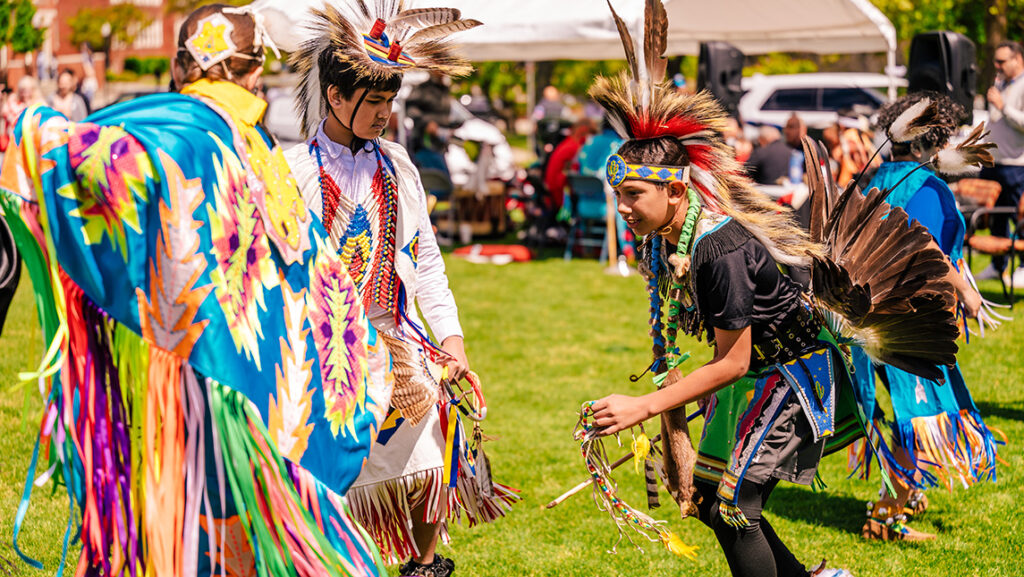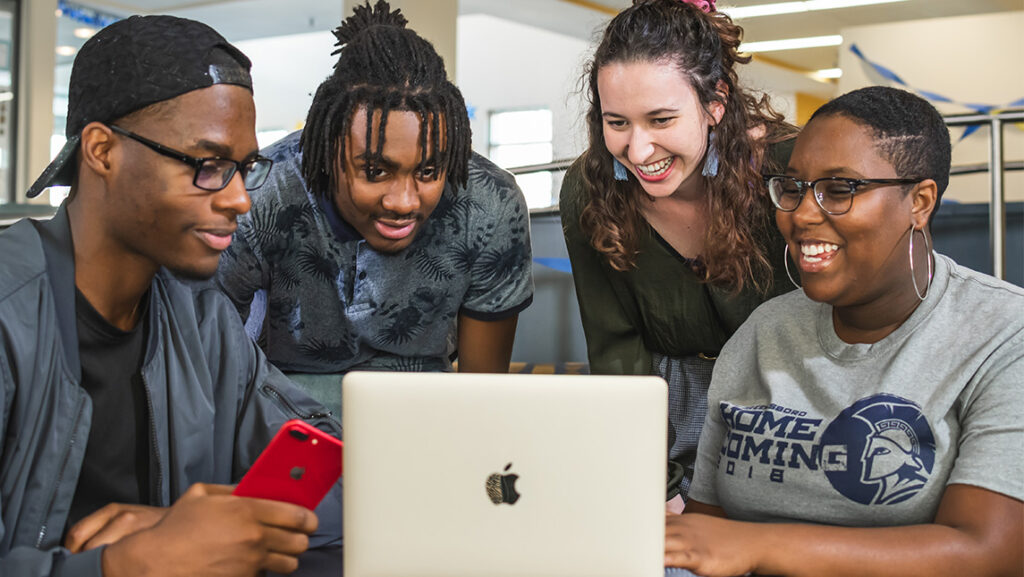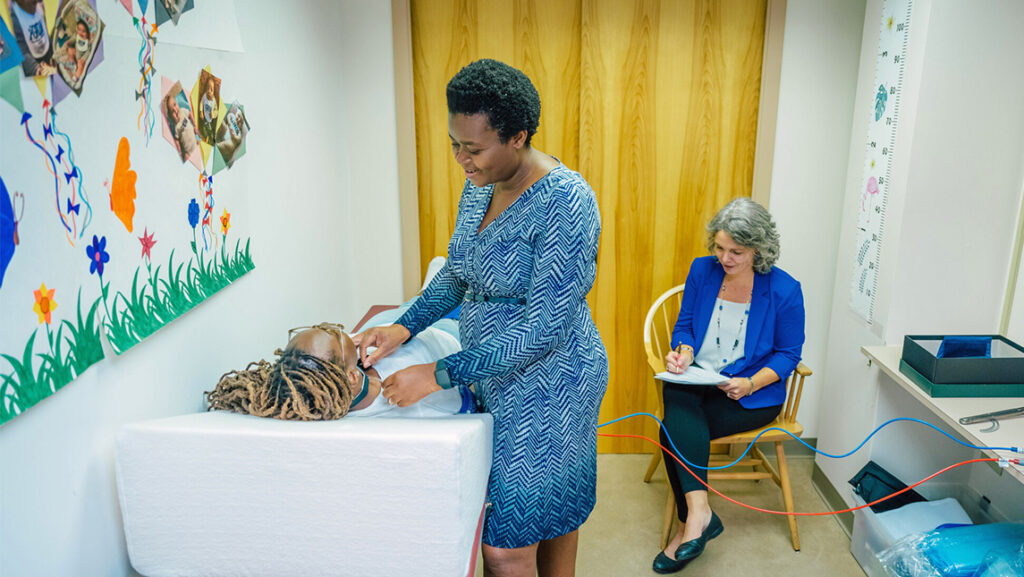Visitors to Stonefield Cellars in Stokesdale, N.C. can browse a selection of wines with names such as Dread Pirate Robert’s Bloody Red Wine, BellaSelena, and Vin de Narle. While they relax on the patio with their glass, they can listen to a concert or a comedy show. They may attend winemaking classes or charcuterie board workshops hosted by Stonefield’s owners Robert and Natalie Wurz.
Some visitors also mingled with UNC Greensboro students who gave them a survey on what kind of customer experience they wanted at Stonefield.
This survey is part of the “NC Wine Consumer Marketing Study” being conducted by Dr. Erick Byrd, associate professor of Marketing, Entrepreneurship, Hospitality and Tourism at the Bryan School of Business and Economics. Byrd’s research team – made up of faculty and students – will compile the survey feedback and form a profile of winery visitors for the NC Wine and Grape Council. These findings will help the council craft successful marketing and promotional campaigns and help the wineries enhance their customer service.
“Most of the wineries in our state make the majority of their revenue from the people who pay a visit,” says Byrd. “We need to know what draws people to those wineries.”
The wine tourism survey gives the students valuable fieldwork and data collection experience. They are already putting their experiences towards their other research projects.
“It was fun to travel to great places that I didn’t know existed before,” says Caroline Lowdermilk, one of the five UNCG students who conducted research at 24 wineries in North Carolina. “Many of these wineries are in small towns or off the beaten path.”
In touch with the trends
UNCG’s Marketing, Entrepreneurship, Hospitality and Tourism department has worked with North Carolina’s wine industry for a little more than a decade, supporting it through research and class assignments that promote agricultural tourism, also known as “agritourism.”
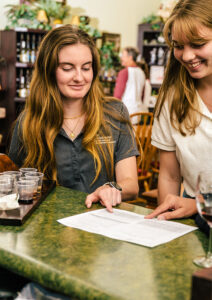
The study is a continuation of a consumer research project the department conducted in 2011-2012. “It was one of the first research projects that we did for the wine industry when our program came over to the Bryan School,” says Byrd.
Lowdermilk, a student in the MBA program at the Bryan School, says, “I found that customers are more inclined towards a family friendly environment – a place where you can bring dogs and kids, a more relaxed and laid-back ambiance – compared to a more formal environment.”
Because this survey builds on the prior research that Byrd did for the industry, his students were able to note how consumer habits changed or remained consistent, and pass that information back to the winery owners.
Caroline Efsen, an international student from Denmark, also participated in the fieldwork. “The winery owners would take us under their wing,” she says. “If we got a certain amount of surveys from one winery, we would give them personalized data from their consumers ahead of the final report. So, they were grateful to us. And we’re grateful to them, because it was a crazy good experience.”
Lowdermilk says, “We’ve seen that people have a preference for sustainability, storytelling, good customer service, good marketing, a good website, social media, and we’ve seen how that has evolved.”
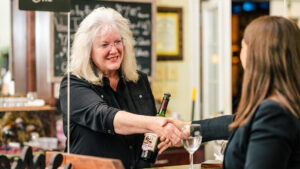
Natalie Wurz, vice president and director of sales and marketing at Stonefield Cellars, can confirm the importance of social media marketing. She and her husband Robert will celebrate the winery’s 17th anniversary in March. “I’m a photographer,” she says. “Using my photography has helped me connect with folks because many people will respond to images, whether it be on Facebook or Instagram.”
The study ties into the sustainability focus of the Bryan School, which is defined as “the enduring interconnectedness of social equity, the environment, economy, and aesthetics.” Dr. Chantell LaPan, Dr. James Boles, Sara MacSween, Sam Troy, and Michael Sloan round out the faculty members working on the project.
LaPan, who teaches courses on sustainable food and beverage and sustainable development, describes sustainability as “environmental, economic, and sociocultural, as well as the availability and the ability to keep progressing,” She – with Byrd, Boles, and Dr. Bonnie Canziani – has previously published research on wineries and agritourism.
Students build on their professors’ work
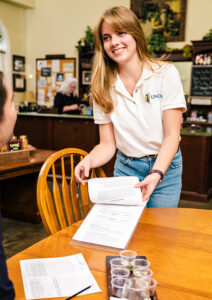
Lowdermilk also completed a research paper titled “North Carolina Agritourism and Slow-Entrepreneurship,” for which she interviewed three local farmers about their experiences with agritourism.
“It is promoting smaller businesses that are local with sustainable practices,” she says. “For instance, they’re growing the grapes here, and they’re producing the wine, so there aren’t initial transportation costs for the product to get here. That helps the environment as well as the local tourist economy. There’s a lot of family-owned wineries here.”
Efsen is incorporating her work into her senior honors project, which is centered around online storytelling and experience.
“Right now I am working in the hotel industry,” she says, “But I want to go on to create luxury experiences for elite clientele within the hospitality industry.”
Real-world impact
The research resonates deeply with their professors. LaPan grew up on a remote rural dairy farm in Vermont. “My grandfather had 40 or 45 cows, and he sold them when he was about 86 years old,” she says. “He had done that his whole life. I watched them struggle with the family farm as farm consolidation really started to happen.”
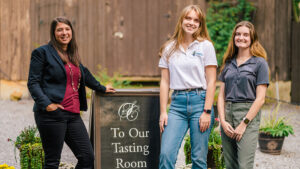
With a background in anthropology and natural resources, LaPan’s tourism research has taken her from North Carolina’s Outer Banks to the mountains, as well as internationally. She’s looked at tensions and relationships between tourism interests and local interests.
She saw how agritourism helps diversify family farms and preserve them, and how heritage preservation programs and sustainable practices can increase brand loyalty.
Many of her students go on to work at major tourism companies like Disney, and hotels such as Marriott. LaPan says, “My goal is that if they’re going to be in these management positions – which is likely where they’ll end up with a degree in hospitality and tourism – that they’re at least aware of the issues that are going on, so that they can better address them and manage them in in their work.”
Byrd shares a similar agricultural upbringing with LaPan. “I did everything that you would do on the family farm – picked potatoes, shelled peas, all that fun stuff.”
While working for the Johnston County visitors bureau, he saw how tourists sought out the experiences of his childhood. “Those things that I took for granted are what people want to see while visiting you-pick-it farms and farmsteads, or doing farm stays, or visiting wineries and the vineyards.”
Byrd says winery and vineyard owners have many stories that brought them there. Some are trying to revitalize a farm that has been in their family for generations. For others, it fulfills a retirement dream.
“I want to enhance the rural communities in North Carolina and make sure that we place value on rural areas and try to maintain the rural landscape that we have in our state.”
Story by Susan Kirby-Smith and Janet Imrick, University Communications
Photography by David Lee Row and Sean Norona, University Communications
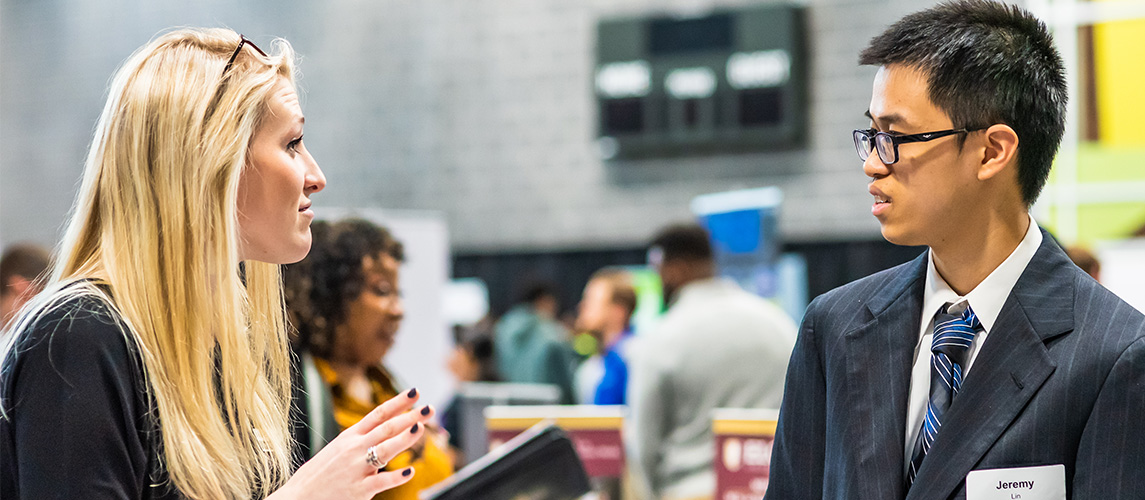
Business savviness starts at UNCG
The Department of Marketing, Entrepreneurship, Hospitality & Tourism provides a strong multidisciplinary advantage to students who want to choose from a wide range of courses, while retaining enough coursework to satisfy students who wish to specialize in one of our disciplines.
